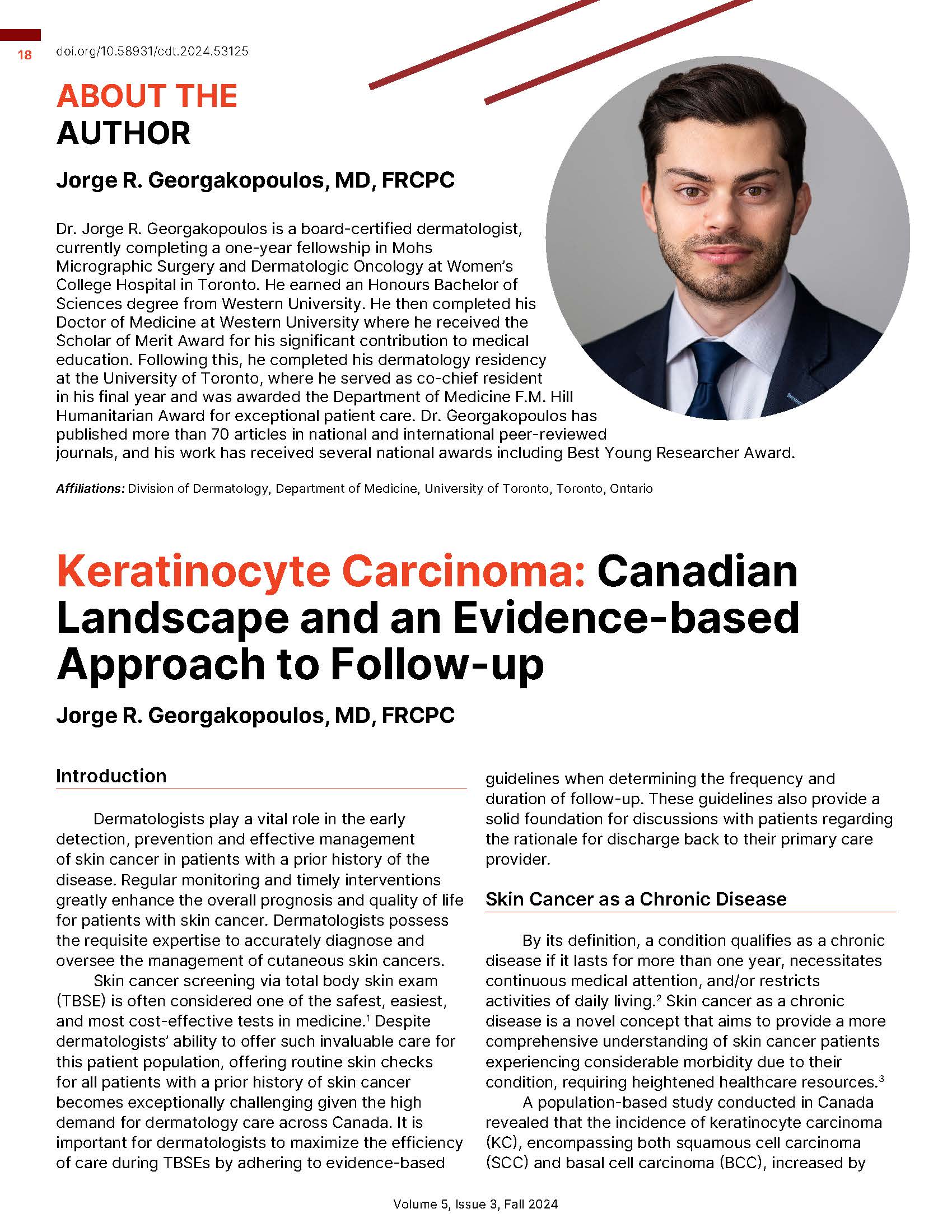Keratinocyte Carcinoma: Canadian Landscape and an Evidence-based Approach to Follow-up
DOI:
https://doi.org/10.58931/cdt.2024.53125Abstract
Dermatologists play a vital role in the early detection, prevention and effective management of skin cancer in patients with a prior history of the disease. Regular monitoring and timely interventions greatly enhance the overall prognosis and quality of life for patients with skin cancer. Dermatologists possess the requisite expertise to accurately diagnose and oversee the management of cutaneous skin cancers.
Skin cancer screening via total body skin exam (TBSE) is often considered one of the safest, easiest, and most cost-effective tests in medicine. Despite dermatologists’ ability to offer such invaluable care for this patient population, offering routine skin checks for all patients with a prior history of skin cancer becomes exceptionally challenging given the high demand for dermatology care across Canada. It is important for dermatologists to maximize the efficiency of care during TBSEs by adhering to evidence-based guidelines when determining the frequency and duration of follow-up. These guidelines also provide a solid foundation for discussions with patients regarding the rationale for discharge back to their primary care provider.
References
Losina E, Walensky RP, Geller A, et al. Visual screening for malignant melanoma: a cost-effectiveness analysis. Arch Dermatol. 2007;143(1):21-8.
Goodman RA, Posner SF, Huang ES, et al. Defining and measuring chronic conditions: imperatives for research, policy, program, and practice. Prev Chronic Dis. 2013;10:E66.
Sutton A, Crew A, Wysong A. Redefinition of skin cancer as a chronic disease. JAMA Dermatology. 2016;152(3):255-6.
Tang E, Fung K, Chan A-W. Incidence and mortality rates of keratinocyte carcinoma from 1998-2017: a population-based study of sex differences in Ontario, Canada. CMAJ. 2021;193(39):E1516-E1524.
Wehner MR, Linos E, Parvataneni R, et al. Timing of subsequent new tumors in patients who present with basal cell carcinoma or cutaneous squamous cell carcinoma. JAMA Dermatology. 2015;151(4):382-8.
Telfer NR, Colver GB, Morton CA, British Association of Dermatologists. Guidelines for the management of basal cell carcinoma. Br J Dermatol. 2008;159(1):35-48.
Marcil I, Stern RS. Risk of developing a subsequent nonmelanoma skin cancer in patients with a history of nonmelanoma skin cancer: a critical review of the literature and meta-analysis. Arch Dermatol. 2000;136(12):1524-30.
Jung GW, Metelitsa AI, Dover DC, et al. Trends in incidence of nonmelanoma skin cancers in Alberta, Canada, 1988-2007. Br J Dermatol. 2010;163(1):146-54.
Tang E, Fung K, Chan A-W. Incidence and mortality rates of keratinocyte carcinoma from 1998-2017: a population-based study of sex differences in Ontario, Canada. CMAJ. 2021;193(39):E1516-24.
Hayes RC, Leonfellner S, Pilgrim W, eet al. Incidence of nonmelanoma skin cancer in New Brunswick, Canada, 1992 to 2001. J Cutan Med Surg. 2007;11(2):45-52.
Mirali S, Tang E, Drucker AM, et al. Follow-up of patients with keratinocyte carcinoma. JAMA Dermatology. 2023;159(1):87.
Peris K, Fargnoli MC, Kaufmann R, et al. European consensus-based interdisciplinary guideline for diagnosis and treatment of basal cell carcinoma-update 2023. Eur J Cancer. 2023;192:113254.
National Comprehensive Cancer Network. Basal Cell Skin Cancer, NCCN Guidelines. https://www.nccn.org/guidelines/guidelines-detail?category=1&id=1416. Accessed August 6, 2024.
Nasr I, McGrath EJ, Harwood CA, et al. British Association of Dermatologists guidelines for the management of adults with basal cell carcinoma 2021. Br J Dermatol. 2021;185(5):899-920.
Zloty D, Guenther LC, Sapijaszko M, et al. Non-melanoma skin cancer in Canada Chapter 4: management of basal cell carcinoma. J Cutan Med Surg. 2015;19(3):239-48.
National Comprehensive Cancer Network. Squamous Cell Skin Cancer, NCCN Guidelines. https://www.nccn.org/guidelines/guidelines-detail?category=1&id=1465. Accessed August 6, 2024.
Alam M, Armstrong A, Baum C, et al. Guidelines of care for the management of cutaneous squamous cell carcinoma. J Am Acad Dermatol. 2018;78(3):560-78.
Keohane SG, Botting J, Budny PG, et al. British Association of Dermatologists guidelines for the management of people with cutaneous squamous cell carcinoma 2020. Br J Dermatol. 2021;184(3):401-14.
Stratigos AJ, Garbe C, Dessinioti C, et al. European interdisciplinary guideline on invasive squamous cell carcinoma of the skin: Part 2. Treatment. Eur J Cancer. 2020;128:83-102.
Willenbrink TJ, Ruiz ES, Cornejo CM, et al. Field cancerization: definition, epidemiology, risk factors, and outcomes. J Am Acad Dermatol. 2020;83(3):709-17.
Kitrell B, Crew A, Wysong A, et al. Refining the classification of field cancerization. Dermatologic Surg. 2023;49(3):228-30.


